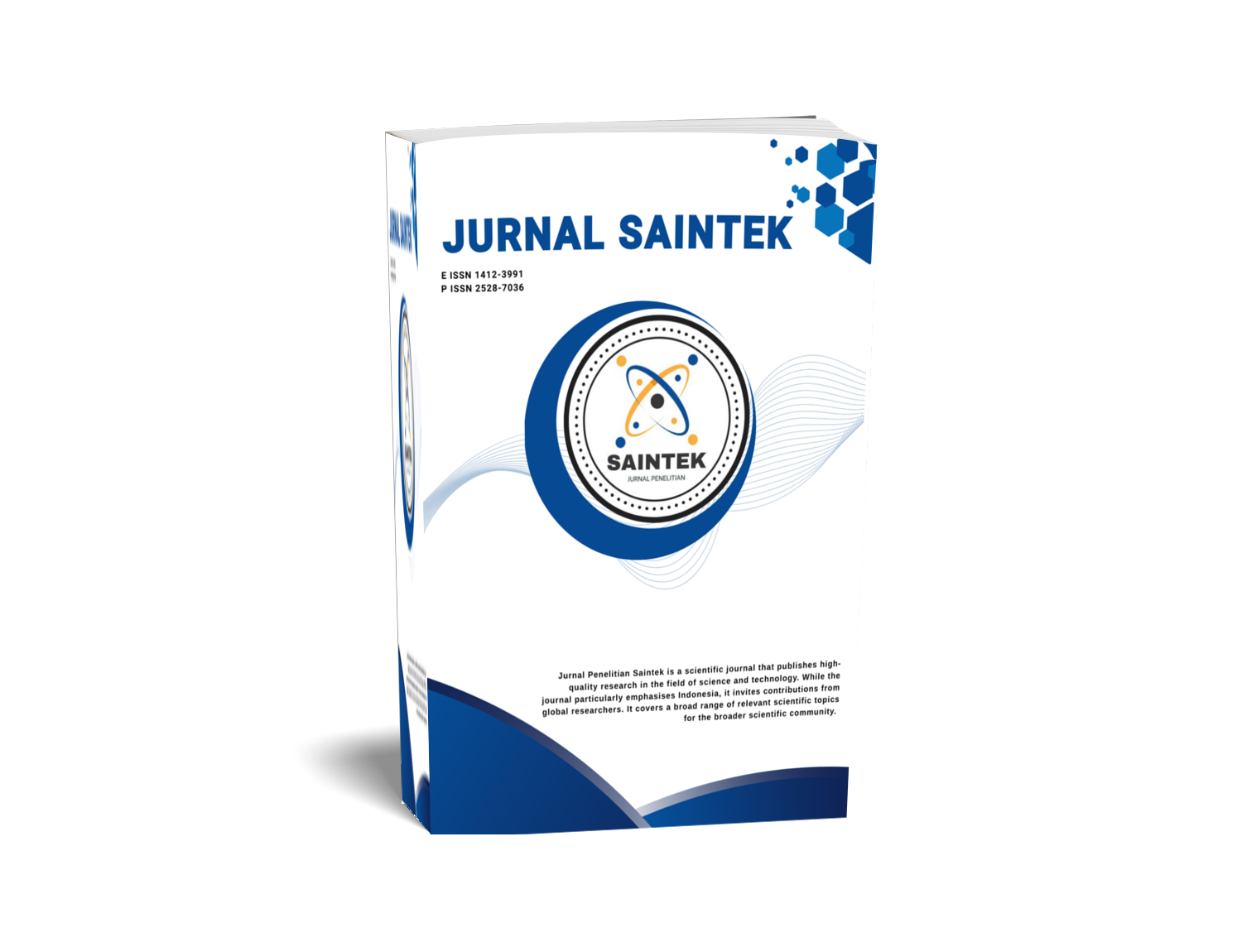Penentuan total fenolik dan flavonoid serta uji aktivitas antioksidan dari daun mangga kultivar madu
DOI:
https://doi.org/10.21831/jps.v1i2.77028Abstract
Penelitian ini bertujuan untuk melakukan uji fitokimia yang meliputi uji alkaloid, flavonoid, saponin, fenolik, kuinon, triterpenoid dan steroid, total fenolik dan flavonoid serta aktivitas antioksidan fraksi etil asetat dan etanol daun mangga kultivar madu. Penelitian diawali determinasi tanaman, preparasi sampel, skrining fitokimia, maserasi dengan etanol 96% dilanjutkan partisi bertingkat menggunakan n-heksana dan etil asetat. Skrining fitokimia dilakukan pada ekstrak dan fraksi yang diperoleh. Fraksi yang diperoleh ditentukan total fenolik dengan metode Folin-Ciocalteu, total fl avonoid dengan metode kolorimetri AlCl3. Aktivitas antioksidan ditentukan dengan metode DPPH. Hasil determinasi tanaman dapat dipastikan sampel adalah Mangifera indica L. kultivar madu, positif mengandung senyawa flavonoid, fenolik, saponin, kuinon, steroid dan triterpenoid. Rendemen fraksi etil asetat dan fraksi etanol berturut-turut sebesar 6,19 dan 5,19%. Kadar total fenolik fraksi etil asetat daun mangga kultivar madu berturut-turut sebesar 423,7 ± 3,68 mg GAE/g dan 48,2 ± 0,139 mg QE/g. Kadar total flavonoid fraksi etanol berturut-turut sebesar 132,35 ± 1,95 mg GAE/g dan 27,72 mg QE/g. Nilai IC50 fraksi etil asetat dan fraksi etanol berturut-turut sebesar 17,83 dan 79,73 ppm. Daun mangga kultivar madu dapat berperan sebagai agen antioksidan dengan kategori kuat pada fraksi etanol dan sangat kuat pada fraksi etil asetat.
Kata kunci: total fenolik, total flavonoid, antioksidan, Mangifera indica L
Determination of total phenolics and flavonoids content and test of antioxidant activity of mango leaves honey cultivar
Abstract: This research aims to carry out phytochemical tests which include tests for alkaloids, flavonoids, saponins, phenolics, quinones, saponins, triterpenoids and steroids, total phenolics and fl avonoids as well as antioxidant activity of the ethyl acetate and ethanol fractions of honey cultivar mango leaves. The research began with plant determination, sample preparation, phytochemical screening, maceration with 96% ethanol followed by multilevel partitioning using n-hexane and ethyl acetate. Phytochemical screening was carried out on the extracts and fractions obtained. The fractions obtained were determined as total phenolics using the Folin Ciocalteu method, total flavonoids using the AlCl3 colorimetric method. Antioxidant activity was determined by the DPPH method. The results of the plant determination confi rmed that the sample was Mangifera indica L. honey cultivar, positive for containing flavonoid, phenolic, saponin, quinone, steroid and triterpenoid compounds. The yields of the ethyl acetate fraction and ethanol fraction were 6.19 and 5.19% respectively. The total phenolic content of the ethyl acetate fraction of honey cultivar mango leaves was respectively 423.7 ± 3.68 mg GAE/g and 48.2 ± 0.139 mg QE/g. The total flavonoid content of the ethanol fraction was 132.35 ± 1.95 mg GAE/g and 27.72 mg QE/g, respectively. The IC50 values of the ethyl acetate fraction and ethanol fraction were 17.83 and 79.73 ppm respectively. Honey cultivar mango leaves can act as an antioxidant agent with a strong category in the ethanol fraction and very strong in the ethyl acetate fraction.
Keywords: total phenolics content, total flavonoids content, antioxidant, Mangifera indica L
References
Bancuta, O. R., Chilian, A., Bancuta, I., Setnescu, R., Setnescu, T., Gheboianu, A., & Sinaia, A. (2016). Improvement of spectrophotometric method for determination of phenolic compounds by statistical investigations based on the measurement of absorbance at a wavelength of about 760 nm. For. Rom. Journ. Phys., 61(7), 1255-1264.
Blois, M. S. (1958). Antioxidant determinations by the use of a stable free radical. Nature,
(4617), 1199-1200.
Chang, C.-C., Yang, M.-H., Wen, H.-M., & Chern, J.-C. (2002). Estimation of total flavonoid content in propolis by two complementary colometric methods. Journal of Food and Drug Analysis, 10(3), 178-182.
Dhital, K. S. (2017). Phytochemical screening and antioxidant activities of Mangifera indica leaves grown in temperate region of the Nepal. Journal of Pharmacognosy and Phytochemistry, 6(3), 205-209.
Diso, S., Ali, M., Mukhtar, S., & Garba, M. (2017). Antibacterial activity and phytochemical screening of mangifera indica (Mango) stem and leaf extracts on clinical isolates of methicillin resistant Staphylococcus aureus. Journal of Advances in Medical and Pharmaceutical Sciences, 13(1), 1-6. https://doi.org/10.9734/jamps/2017/31127.
Ediriweera, M. K., Tennekoon, K. H., & Samarakoon, S. R. (2017). A Review on Ethnopharmacological applications, pharmacological activities, and bioactive compounds of Mangifera indica (Mango). Evidence-Based Complementary and Alternative Medicine,
https://doi.org/10.1155/2017/6949835
Fachriyah, E., Kusrini, D., Haryanto, I. B., Wulandari, S. M. B., Lestari, W. I., & Sumariyah, S. (2020). Phytochemical test, determination of total phenol, total flavonoids and antioxidant
activity of ethanol extract of Moringa Leaves (Moringa oleifera Lam). Jurnal Kimia Sains
Dan Aplikasi, 23(8), 290-294. https://doi.org/10.14710/jksa.23.8.290-294.
Farnsworth, N. R. (1966). Biological and phytochemical screening of plants. Journal of
Phurmaceulical Sciences, 151(3712), 874-875. https://doi.org/10.1126/science.151. 3712.874
Ghasemzadeh, A., & Ghasemzadeh, N. (2011). Flavonoids and phenolic acids: Role and biochemical activity in plants and human. Journal of Medicinal Plant Research, 5(31),
-6703. https://doi.org/10.5897/JMPR11.1404
Ghosh, B., Majumder, S., Acharyya, S., Ghosh, A., Saha, S., Sarkar, S., Chakraborty, S., & Bhattacharya, M. (2022). Comparative phytochemical analysis of mature mango leaves from nineteen cultivars of Murshidabad district, India. Asian Journal of Natural Product Biochemistry, 20(2), 48-55. https://doi.org/10.13057/biofar/f200202.
Ibrahim, Y., Busari, M., Yusuf, R., & Hamzah, R. (2020). In vitro antioxidant activities of ethanol, ethyl acetate and n-hexane extracts of Mangifera indica leaves. Tanzania Journal of Science, 46(3), 628-635. https://doi.org/10.4314/tjs.v46i3.5.
Ito, N., Fukushima, S., & Tsuda, H. (1985). Carcinogenicity and modiï¬cation of the carcinogenic response by bha, bht, and other antioxidants. Critical Reviews in Toxicology, 15(2), 109-
https://doi.org/10.3109/10408448509029322.
Jhaumeer Laulloo, S., Bhowon, M. G., Soyfoo, S., & Chua, L. S. (2018). Nutritional and biological evaluation of leaves of Mangifera indica from Mauritius. Journal of Chemistry,
https://doi.org/10.1155/2018/6869294.
Julkunen-Tiitto, R. (1985). Phenolic constituents in the leaves of northern willows: methods for the analysis of certain phenolics. Journal of agricultural and food chemistry, 33(2), 213-
https//doi.org/10.1021/jf00062a013.
Kingne, F. K., Djikeng, F. T., Tsafack, H. D., Karuna, M. S. L., & Womeni, H. M. (2019).
Phenolic content and antioxidant activity of young and mature mango (Mangifera indica)
and avocado (Persea americana) leave extracts. International Journal of Phytomedicine,
(4), 181. https://doi.org/10.5138/09750185.2289.
Kulkarni, V. M., & Rathod, V. K. (2018). Exploring the potential of Mangifera indica leaves extract versus mangiferin for therapeutic application. Agriculture and Natural Resources,
(2), 155-161. https://doi.org/10.1016/j.anres.2018.07.001.
Kumar, M., Saurabh, V., Tomar, M., Hasan, M., Changan, S., Sasi, M., Maheshwari, C., Prajapati, U., Singh, S., Prajapat, R. K., Dhumal, S., Punia, S., Amarowicz, R., & Mekhemar, M. (2021). Mango (Mangifera indica l.) leaves: Nutritional composition, phytochemical proï¬le, and health-promoting bioactivities. Antioxidants, 10(2), 1-23. https://doi.org/10.3390/ antiox10020299.
Lestari, D., Alim, M. D. M., Pratiwi, J., & Saputri, L. H. (2022). Uji aktivitas antioksidan ekstrak etanol daun mangga kasturi (Mangifera casturi Kosterm.). Jurnal Riset Kefarmasian Indonesia, 3(3), 162-173.
Masibo, M., & He, Q. (2008). Major Mango polyphenols and their potential signiï¬cance to human health. Compr Rev Food Sci Food Saf., 7(4), 309-319.
Mathias, Amour, Ahomadegbe, Eléonore, Yayi, Ladekan, Norbert, Togbenou, Assogba, F.M., Agbonon, A., & Gbénou, J. D. (2018). Phytochemical and toxicity studies of the leaves of Mangifera indica, Cajanus cajan and of Piliostigma thonningii, acclimated in Benin, used against diarrheal disease. Journal of Pharmacognosy and Phytochemistry, 7(2), 2971-
Ojo, O. A., Afon, A. A., Ojo, A. B., Ajiboye, B. O., Oyinloye, B. E., & Kappo, A. P. (2018).
Inhibitory effects of solvent-partitioned fractions of two nigerian herbs (Spondias mombin Linn. and mangifera indica L.) on α-amylase and α-glucosidase. Antioxidants, 7(6). https:// doi.org/10.3390/antiox7060073
Pamungkas, D. K., Retnaningtyas, Y., & Wulandari, L. (2017). Pengujian aktivitas antioksidan kombinasi ekstrak metanol daun mangga gadung ( Mangifera indica L . var . gadung ) dan ekstrak etanol daun pandan wangi (Pandanus amaryllifolius Roxb.). Jurnal Pustaka Kesehatan, 5(1), 46-49.
Prior, R. L., Wu, X., & Schaich, K. (2005). Standardized methods for the determination of antioxidant capacity and phenolics in foods and dietary supplements. Journal of Agricultural and Food Chemistry, 53(10), 4290-4302. https://doi.org/10.1021/jf0502698
Rocha Ribeiro, S. M., De Queiroz, J. H., Lopes Ribeiro De Queiroz, M. E., Campos, F. M., & Pinheiro Sant'Ana, H. M. (2007). Antioxidant in mango (Mangifera indica L.) pulp. Plant Foods for Human Nutrition, 62(1), 13-17. https://doi.org/10.1007/s11130-006-0035-3.
Severi, J. A., Lima, Z. P., Kushima, H., Monteiro Souza Brito, A. R., Campaner dos Santos, L., Vilegas, W., & Hiruma-Lima, C. A. (2009). Polyphenols with antiulcerogenic action from aqueous decoction of mango leaves (Mangifera indica L.). Molecules, 14(3), 1098-1110.
Shinde, S. S., & Chavan Babasaheb, A. R. (2014). Isolation of mangiferin from different varieties of Mangifera indica dried leaves. International Journal of Scientiï¬c & Engineering Research, 5(6), 928-934. http://www.ijser.org
Subedi, L., Timalsena, S., Duwadi, P., Thapa, R., Paudel, A., & Parajuli, K. (2014). Antioxidant activity and phenol and flavonoid contents of eight medicinal plants from Western Nepal. Journal of Traditional Chinese Medicine, 34(5), 584-590. https://doi.org/10.1016/s0254-
(15)30067-4
Suwardike, P., Rai, I. N., Dwiyani, R., & Kriswiyanti, E. (2018). Antioksidan Pada Mangga.
Agro Bali: Agricultural Journal, 1(2), 120–126. https://doi.org/10.37637/ab.v1i2.313
Tzima, K., Brunton, N. P., & Rai, D. K. (2020). Evaluation of the impact of chlorophyll removal techniques on polyphenols in rosemary and thyme by-products. Journal of Food Biochemistry, 44(3), 1-22. https://doi.org/10.1111/jfbc.13148.
Downloads
Published
How to Cite
Issue
Section
Citation Check
License
Who Can Submit?
Any individual may submit an original manuscript for consideration for publication in Jurnal Penelitian Saintek as long as they hold the copyright to the work or are authorized by the copyright owner(s) to submit it. Authors retain initial ownership of the copyrights to their works prior to publication, except in cases where, as a condition of employment, they have agreed to transfer copyright to their employer.
User Rights
Jurnal Penelitian Saintek is an Open Access journal. Users are granted the right to read, download, copy, distribute, print, search, or link to the full texts of articles, provided they comply with the conditions of the Creative Commons Attribution-ShareAlike License 4.0 (CC BY-SA 4.0).
https://creativecommons.org/licenses/by-sa/4.0/
Author Rights
Authors retains copyrights.
Jurnal Penelitian Saintek by http://journal.uny.ac.id/index.php/saintek is licensed under a Creative Commons Attribution-ShareAlike 4.0 International License.









